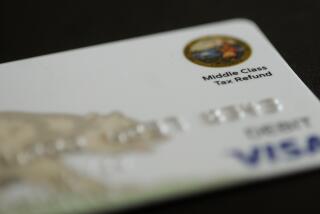Taxed to the Max : Starting Over’s a Nightmare When the State Wants Its Money
- Share via
Six years ago, Richard M. Kelly was a Beverly Hills department store salesclerk yearning to be self-employed. Kelly, then 28, rounded up $600 and a co-worker as a partner, bought a refrigerator, and opened a wholesale seafood business in Hollywood.
One ownership battle and personal bankruptcy later, the aspiring entrepreneur had gone from recording annual sales of $650,000 to accumulating nearly $129,000 of debt. Yet, putting the past behind him, the indefatigable Kelly started over with a smaller, one-man company.
There’s only one catch.
Since April, he has been battling the state over $20,000 in state employee withholding taxes it says he owed on the business he closed in 1986.
“They’re maniacs,” said Kelly, who lives in a one-bedroom Venice apartment. “You’d think it was personally owed to (the state Employment Development Department), and you’d think it was their last dying gasp.
“And that’s assuming their figure is right,” the businessman said.
For Kelly, the tempest of his 1987 bankruptcy has yielded to a stubborn dark cloud of tax woes, taxes that the state demands he pay but which he insists he never owed.
Despite nearly 20 conversations on the telephone and in person with the state Employment Development Department in recent months, Kelly says, its agents refused to acknowledge that his old seafood business was closed and that its employees had been released in the process.
State officials denied him a legal review of his problem until he paid the balance due and imposed a tax lien upon him. The lien, equal to the liability, hamstrung his new business and his ability to secure housing and credit.
To add insult to injury, the department refused to accept any payment from Kelly unless he could meet the minimum interest charges, which he could not. Kelly, who expects to earn $16,000 this year after emerging from bankruptcy with only a 1974 Plymouth and $2,000 in assets of clothing, furniture, a watch and a necklace, had offered to pay $50 a month on a $19,700 tax debt.
“I believe that they’re trying to screw me, and that’s why they’re not giving me a hearing, and that’s why they have a tax lien on me, and they believe they can just drum this out of me,” Kelly said this week. “It’s just been a total impediment to my business, of doing anything, of my having a place to live.”
Collection officers assigned to Kelly’s case declined to comment, but the head of collections for the agency said the situation described by Kelly is extremely uncommon.
John Nappi, chief of special procedures for collection, said that the problem might have stemmed from something as simple as a clerical error.
“We don’t always get notified” of bankruptcy proceedings, Nappi said. “If (bankrupt business owners) list us as a creditor, we should get notified from bankruptcy court. But there are so many of those, sometimes they fall through the cracks.”
Last year, 39,655 Chapter 7 bankruptcies were filed in the central California district.
Department Was Listed
Yet federal bankruptcy court documents show that the agency was listed and notified of Kelly’s case, and that it even filed a claim on Kelly’s assets, indicating that the department was aware of the business closure.
“If we file a bankruptcy claim, we should have known he was out of business,” said Nappi. “If we file a claim in the bank, then it would be rare that (assessing additional taxes) would happen.”
And Nappi said the department is given the right by law to deny taxpayers a review of their accounts once tax assessments have been finalized until the balance is paid. It is not a policy shared by the IRS, said Gary B. Baddin, special procedures adviser for IRS regional collections.
Kelly said he had no problems with the IRS, which negotiated a payment plan in one meeting this summer without additional penalties.
The confusion stems from Kelly’s Blue Oyster Brokerage, the seafood company he formed that self-destructed in a bitter ownership struggle that began in 1985. Faced with mounting legal and accounting fees, Kelly shut the business down in December, 1986. Running out of options in the face of $128,831 in debts, he declared straight bankruptcy the next May.
Federal court documents show that Kelly also owed $2,873 in taxes to the employment department and $4,851 to the IRS. Under law, tax liabilities generally survive a bankruptcy, although a debtor is shielded from collectors while his case is being decided.
Ignored Warning
Kelly says he received a notice to pay the state while his case was still being reviewed in court. He thus ignored the warning, and his bankruptcy case was discharged in October, 1987.
This April, however, he received notice that the state had recalculated taxes and penalties due as $10,500. Kelly said he assumed that it was an error and did not pursue the matter after leaving a telephone message with the department.
But in May, he was notified that he owed more than $19,700.
“It was at that point that I said, ‘Obviously there must be some problems here,’ ” he said.
Alarmed, Kelly contacted department Compliance Officer Karen Holmes, who told him that the state considered his business ongoing. The state was assessing additional withholding taxes based on amounts he had paid in previous years, in addition to interest and penalties. According to Nappi, it is typical for accounts to emerge out of the agency’s computer system up to three years after they have become delinquent.
When Kelly tried to explain that his business had closed, Holmes told him only that he was required by law to pay the balance. His offers for a payment plan were dismissed as inadequate. Kelly spoke with Holmes’ supervisor, Lee Rebman, who reiterated that Kelly had no recourse. Frustrated, the debtor went directly to the department’s regional office in Santa Monica. There, an officer reduced his balance to about $8,000.
Can’t Understand Reductions
On Wednesday, Kelly found that his balance had been reduced to $5,000. But Kelly, who admits owing the original $2,873 plus interest and penalties to the state, said he still does not know why his balance has been adjusted.
“It makes you wonder if they say, ‘Let’s send him an invoice of $19,000 and let’s see if he’s stupid enough to pay it,’ ” said Kelly. “You know, the thing is kind of unjust.”
On Thursday, Nappi said Kelly’s problem probably stemmed from a bureaucratic mix-up entered into the agency’s computer system when Kelly filed and dropped a Chapter 13 bankruptcy in January, 1987, then filed under Chapter 7 four months later.
According to Nappi, who had spoken with Holmes and Rebman, it simply took several months for the office’s completely automated computer system to realize that Kelly had gone bankrupt. Nappi said there should have been a human fail-safe system and said it was odd that Kelly could not straighten out the matter by reaching someone with authority and presenting his documents.
Kelly never considered producing the records, he said, because he was told repeatedly that there was no way to change his balance.
Meanwhile, the $5,000 seems about right, given the $2,800 original balance and nearly three years of interest, Nappi said. And Kelly says he learned a lesson:
“Be sure you stay up on your taxes.”
More to Read
Inside the business of entertainment
The Wide Shot brings you news, analysis and insights on everything from streaming wars to production — and what it all means for the future.
You may occasionally receive promotional content from the Los Angeles Times.










